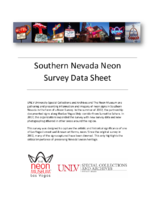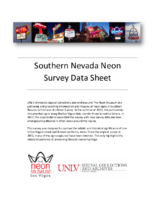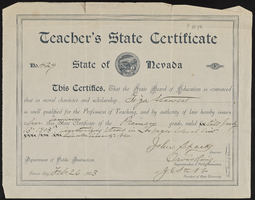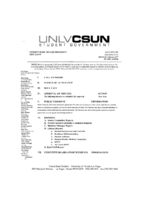Search the Special Collections and Archives Portal
Search Results
Kendall Stagg Collection
Identifier
Abstract
The Kendall Stagg Collection (1998-2000) consists of material documenting Kendall Stagg’s political races in northern Nevada and also details gay activism in Reno. The collection consists of Stagg campaign materials, a t-shirt from one of his campaigns, and documents pertaining to the Gay, Lesbian, and Bisexual Student Union at the University of Nevada, Reno and Gay Pride parade organizing in Reno.
Archival Collection
Johnny Eshow Haig Papers
Identifier
Abstract
The Johnny Eshow Haig Papers (1970-1990) are comprised of contracts, agreements, and correspondence of musician Johnny Haig, who worked as a trombone player and conductor at various hotels in Las Vegas, Nevada from 1955 until 2000. Additionally, the papers house extensive original music scores written by Haig. The papers primarily cover Haig’s later career in the 1970s and 1980s.
Archival Collection
Stardust Hotel and Desert Inn Hotel Photographic Negatives
Identifier
Abstract
The Stardust Hotel and Desert Inn Hotel Photographic Negatives collection consists of black-and-white photographic negatives depicting the Stardust and Desert Inn hotels from approximately 1962 to 1967. The images depict annual and one-time events held at both hotels, including sporting events such as golf and tennis, fashion shows and beauty contests, weddings, and conventions for local and national associations. A significant amount of the collection documents the long running
Archival Collection

Transcript of interview with Lyn Robinson by Barbara Tabach, September 18, 2014
Date
Archival Collection
Description
One day in 2012, UNLV student Lyn Robinson spied a posting on the bulletin board for a photographer for the Sperling Kronberg Mack Holocaust Resource Center. She was an art major with a concentration on photography. She was also had a deep appreciation of the horror of the Holocaust and what the survivors she would take photos of had endured. Thus began a two year project, during which she took photos of over sixty survivors. Her images are preserved at UNLV Special Collections & Archives. Prints are displayed at the Sperling Kronberg Mack Holocaust Resource Center. On September 18, 2014, Lyn shared her work for this oral history recording. She is a native of Florida, daughter of a horticulturist father and pianist mother.
Text

Neonopolis Neon Survey document, September 8, 2017
Date
Archival Collection
Description
Site address: 450 Fremont St
Sign owner: Rohit Joshi leases the building from Wirrulla USA Inc.
Sign details: This building was originally constructed in 2001 as a retail store center. This location currently holds a Denny's, a vintage toy store, the Telemundo station office and an international food market. This location also held a movie theater until 2009.
Sign condition: 4.5- Sign still in relatively new looking condition
Sign form: Entrance sign
Sign-specific description: Above the main entrance way into the mall there are the letter "NEONOPOLIS" in plastic back lit signs. Each letter has a lime green border with white strip and then purple for the main color of the block letters. The letter "O" in "polis" is actually an orbit shape that is orange and purple to double as the "O". Portions of the building have neon tubes, some illuminating blue and others are purple, green, red and yellow. There are also different colored shapes of neon spread throughout the building such as yellow triangle as well as orbits showcasing red and yellow neon tubing. Many of the companies in this location have their own signs as well.
Sign - type of display: Plastic back lit sign and neon
Sign - media: Plastic and steel
Sign - non-neon treatments: Plastic back lit portion
Sign environment: This property is on Fremont in between 4th St. and Las Vegas Blvd. Right in front on the building is the Slotzilla machine where people get onto the zipline.
Sign - date of installation: 2002
Sign - date of redesign/move: When the movie theater portion of this location closed in 2009 part of the signage was taken down and in recent years with different companies settling in there have added their own signs.
Sign - thematic influences: The name and the theme of this location being neonopolis showcases the downtown neon vibe particularly since there is a wide variety of neon display surrounding this property.
Sign - artistic significance: Showcasing the different designs with neon shows how true of an art it still is, particularly with the triangle designs and the orbits
Survey - research locations: Asessors page, https://neonjoshiassociate.wixsite.com/mysite-1 Neonopolis website, https://www.reviewjournal.com/entertainment/food/neonopolis-theaters-to-go-dark-thursday-night/ Review Journal article discussing the closure of their movie theater, https://lasvegassun.com/news/2002/may/03/long-awaited-neonopolis-opens-in-downtown-vegas/ Las Vegas Sun article talking about their opening in 2002
Survey - research notes: There used to be an 18 theater movie theater located there which shut down in 2009 and was renovated into clubs, the most recent one to open is called the Nerd.
Surveyor: Emily Fellmer
Survey - date completed: 2017-09-08
Sign keywords: Plastic; Backlit; Neon; Steel; Fascia
Text

LaPalm Motel Neon Survey document, September 10, 2017
Date
Archival Collection
Description
Site address: 2512 Fremont St
Sign owner: La Palm Motel Inc
Sign details: Property originally constructed in 1963 on 0.33 acres.
Sign condition: 3 - the sign is in decent condition and appears worn from weather. It is unclear if the sign still lights up at night.
Sign form: Roadside pole sign
Sign-specific description: This pole roadside sign has a simple design. A large black pole supports the other elements for this sign. The top portion of the sign features a plastic, backlit sign reading "La Palm" in a black, serif text. Underneath the "lm" of the "La Palm" sign is a series of open channel letters spelling out "MOTEL" against a faded teal background. This portion of the sign is also a thin, rectangular shape allowing for an open space between the "MOTEL" of the sign and the pole that supports it. Underneath the "L" of the "MOTEL" is the bottom portion of the sign that is attached to the pole. This portion of the sign features a plastic, backlit sign reading "DAILY WEEKLY CABLE TV POOL KITCHENETTES LAUNDROMAT" in bold red letters against a white background. Under this is the word "VACANCY" painted in bold white text. Neon tubes spell out "NO" and outline "VACANCY." Along the outer edge of this sign facing Fremont, the sign is painted a pale yellow with incandescent light bulbs lining this section.
Sign - type of display: Neon, indandescent, backlit
Sign - media: Steel and plastic
Sign - non-neon treatments: Paint
Sign environment: This property sits at the corner of East Charleston and Fremont in an area filled with many other smaller motels. There is a Pepe's Taco and Lowe's Home Improvement that close to this motel.
Sign - date of installation: Possibly c. 1963
Sign - thematic influences: There is no exact theme replicated in this sign. It does look similar to other motel signs throughout the city since it sits directly along the roadside allowing motorist and pedestrians to see it easily.
Sign - artistic significance: This sign is a standard example of motel signage because it features the basic elements of a roadside motel sign. It has the name of the property, the word "motel", and other amenities that they may offer.
Survey - research locations: Assessor's website
Survey - research notes: http://www.roadsidepeek.com/roadusa/southwest/nevada/vegas/lvmotel/lvdownmotel/index4.htm
Survey - other remarks: There is not a date of any specific redesign of this sign; however, based on an earlier image of this sign the font in the "La Palm" portion of the sign did change somewhere along the way during the time this property has been around.
Surveyor: Lauren Vaccaro
Survey - date completed: 2017-09-10
Sign keywords: Neon; Incandescent; Backlit; Steel; Plastic; Paint; Pole sign; Roadside
Text
DeRionne P. Pollard (Nevada State University) oral history interview conducted by Magdalena Martinez and Taylor Cummings: transcript
Date
Archival Collection
Description
From the Lincy Institute "Perspectives from the COVID-19 Pandemic" Oral History Project (MS-01178) -- Education sector interviews file.
Text

Stewart family legal papers and certificates
Date
Archival Collection
Description
Stewart family legal papers and certificates
Text

Meeting minutes for Consolidated Student Senate, University of Nevada, Las Vegas, February 25, 2008
Date
Archival Collection
Description
Text
Red Rock Canyon National Conservation Area Records
Identifier
Abstract
The Red Rock Canyon National Conservation records (1965-2007) contain information about the Red Rock Canyon National Conservation Area (previously the Red Rock Canyon Recreation Lands). It largely consists of newspaper clippings on a variety of events related to Red Rock Canyon from 1965 to 1998 with the bulk from the 1980s and 1990s. The records also include Bureau of Land Management documents pertaining to interpretive efforts, visitation statistics, and law enforcement reports. Also included are the newsletters (1990-1998) and volunteer training manual of the Friends of Red Rock Canyon, a non-profit volunteer organization.
Archival Collection
